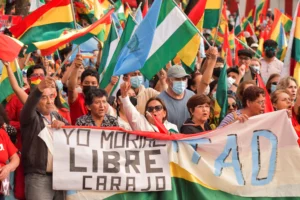In Bolivia, President Luis Alberto Arce has enacted a law for this year’s judicial elections after 16 days of protests.
These roadblocks, linking Cochabamba, Oruro, and La Paz, demanded a return to constitutional norms.
Arce highlighted that adhering to the constitution by holding judicial elections is crucial for national peace.
The elections, initially planned for 2023, were delayed due to candidate selection issues.
Social leaders criticized the judiciary for overstepping its terms and ignoring merit-based selection.

The announcement led to the gradual end of protests, involving over 4,000 people and 20 blockade sites.
The new law introduces a structured timeline: 80 days for candidate pre-selection and 150 days for organizing the elections. Results will follow within 15 days.
Blockades, starting January 22 in Parotani by “evistas,” stopped post-announcement.
Arce noted, despite deeming blockades unnecessary, that the people’s decision in the elections will be pivotal.
This move to judicial elections underlines Bolivia‘s efforts to resolve conflicts through constitutional adherence, aiming to ensure the justice system’s integrity.
In addition, the transition from protest to planned elections demonstrates the power of civic engagement in shaping governance.
Background
This decision marks a significant moment in Bolivia’s political landscape, reflecting the government’s responsiveness to public outcry.
Historically, Bolivia has faced challenges in maintaining judicial independence and transparency.
In short, the call for judicial elections stems from a deeper desire among Bolivians for a fair and accountable legal system.

